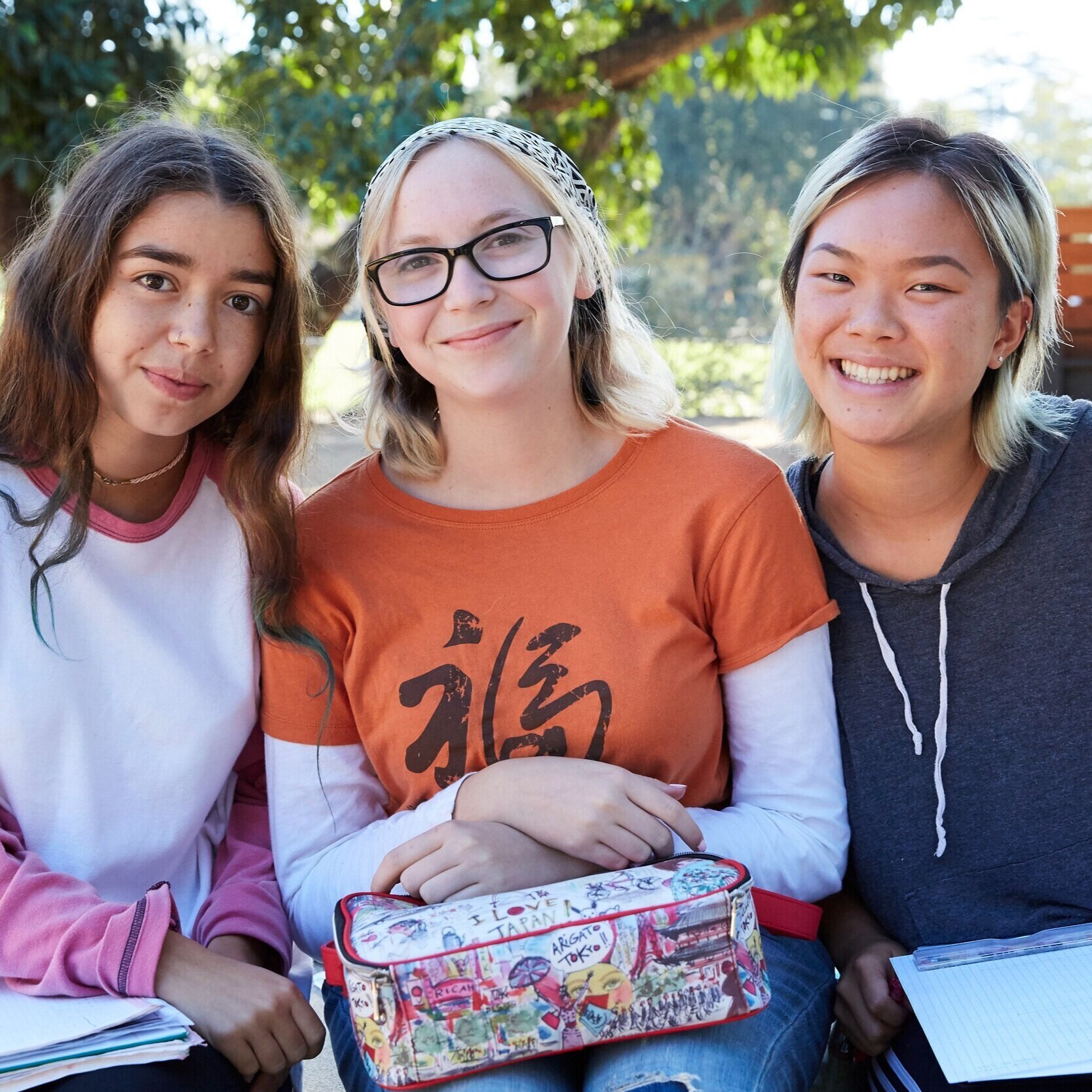
How Waldorf Students Stand Out
With an increasingly competitive college admissions process, grades and test scores are no longer the final deciding factors for students to be accepted into the colleges of their choice. Applicants need to find ways to distinguish themselves from the crowd. Waldorf school graduates bring a unique perspective, set of experiences, and skill set. The Waldorf approach, which incorporates the arts, outdoor education and hands-on learning into academics, helps our graduates stand out as individuals. They are curious, creative, and confident, experienced in working with their peers, their hands and their minds. Their ability to listen, articulate their ideas, advocate for themselves and others, and work both independently and collaboratively helps them thrive in college and beyond. That is why colleges and universities across the country have recognized the degree to which Waldorf graduates enhance their student bodies.

A Thoughtful Approach to Homework
Too often, homework can be meaningless busywork that stresses and overwhelms students and their families, crushes creativity, and has little impact on children's future success. In Waldorf education, we take a thoughtful, age-appropriate and balanced approach, where homework is introduced later, and is focused on meaningful assignments that foster creativity and further their understanding.

Engaging Students Through Wonder and Awe
Waldorf education’s approach to learning is designed to nurture a sense of curiosity, creativity, and wonder. Through immersive experiences in the visual and performing arts, science, history, and nature-based learning, students develop a profound appreciation for beauty and creativity, engaging the imagination and allowing the unique development of each individual. By intentionally weaving in moments of wonder and awe into our curriculum, we strive to inspire student’s curiosity and engagement with their immediate surroundings, their community and the wider world.

Working with Your Hands Does Wonders for Your Brain
Recent research highlights the cognitive benefits associated with working with your hands. By providing a much-needed break for your active mind, hands-on work promotes relaxation and revitalization. That's why Waldorf education integrates arts, movement, and practical tasks throughout the curriculum, ensuring students work with their hands daily.

The Power of Phone-Free Classrooms
Since the widespread popularity of smartphones and social media, many studies have shown that social, emotional and mental health issues among children and teens have increased by nearly 50%. In a world dominated by smartphones, Waldorf schools present an alternative by implementing a no-phone policy. By eliminating the distraction of screens in the classroom, Waldorf education enables students to explore their authentic selves, form meaningful relationships, and focus on a well-rounded education that prepares them for a purposeful and happy future.

Education for an Unpredictable Future
A new poll found that 74 percent of high school students think they’ll have a job in 20 years that hasn’t been invented yet. How do schools prepare students for that future? In Waldorf education we focus on helping students develop creativity and problem solving skills, communication, teamwork, and empathy, as well as the ability to take their ideas and put them into practice in the real world. These skills are foundational, and prepare students to successfully navigate the unpredictable and rapidly changing world of work and the diverse paths to higher education.

How Kids Fall in Love with Reading
Since the 1980’s there has been a double digit decline in the number of kids who say they read for pleasure. What accounts for this? A standardized test-driven shift towards textual analysis, where students increasingly are asked to dissect small and out-of-context segments of text, and where reading aloud and reading entire stories have fallen by the wayside. In Waldorf education, we take the opposite approach. We start with engaging the children’s imaginations through storytelling and reading aloud. We know that love of reading starts with a love of stories, and that a love of reading opens up a lifetime love of learning.

The Power of Problem Solving
The ability to problem solve is one of the most important skills for students to learn, not only for their academic journey but for their future careers and lives in an ever-changing world. Waldorf Education encourages the development of problem-solving skills through an approach that emphasizes systems thinking and critical thinking, collaboration, creativity, and in-depth subject knowledge.

Class Plays and Theater as Tools for Learning
Theater is considered such an important educational tool in Waldorf education that most grades will perform a play together every year. These “class plays” have a wide range of benefits for both the individual students and for the class as a whole, including building self-confidence, teaching students how to work collaboratively on a complex project, helping students develop empathy, and allowing them to explore and develop their own identity.

Waldorf Schools are Media Literacy Role Models
Waldorf education emphasizes thoughtful, intentional and developmentally appropriate technology use. We advocate for an experiential, relationship-based approach in early education, followed by a curriculum for older students that helps them understand tech as a tool, and engages them in conversations around digital ethics, privacy, media literacy, and balanced use of social media and technology. Our approach gives Waldorf graduates the tools and knowledge they need to be independent, creative, and ethical digital citizens.

How Outdoor Learning Affects Students
A recent study focusing on children aged 5 to 18 revealed that outdoor education and activities have a multitude of benefits for students. Not only did students exhibit higher levels of self-confidence, stronger friendships, and a greater sense of belonging, but academic performance in math, science, and language also saw an improvement, coupled with increased motivation to learn. Waldorf education places significant value on diverse forms of outdoor learning and experiences, such as scientific observation and environmental projects, camping, field trips, and free exploratory play.

Waldorf Graduates Pursue Meaningful Careers
Waldorf education strives to prepare children for a full and engaged life as change-makers in the world, which is evident in the career paths of its alumni. A 60-year survey of Waldorf graduates showed a diverse array of professions and occupations including medicine, law, science, engineering, computer technology, the arts, social science, government, and teaching at all levels–fields that require the skills and values instilled by Waldorf schooling. The ability to adapt, think creatively, demonstrate kindness, solve problems, communicate effectively, nurture a love of learning, and work collaboratively are just a few of the lifelong benefits of holistic, whole-child education.

Adaptability Quotient: Educating for an Uncertain Future
With increasingly rapid changes in the nature of work, employers are interested not just in intelligence and social skills, but in an employee’s adaptability quotient–their ability to adjust to new challenges with flexibility, curiosity, courage, resilience, and problem-solving skills. In Waldorf education, we deepen rigorous academics by integrating art, outdoor education, music, theater, practical work, movement and hands-on learning. The depth and breadth of the Waldorf curriculum challenges students and develops crucial capacities that will help them adapt and thrive throughout their lives.

Theater Develops Creativity, Empathy and Confidence
The performing arts help children develop a range of beneficial life skills, such as quick thinking, problem solving, and building self confidence. Theater strengthens empathy by asking a child to embody what their character is feeling and experiencing, and putting on a play also requires students to work as a team. In Waldorf education, students are involved in class plays and musical performances every year. We see the wide-ranging positive impact on our students and the powerful boost to their self confidence that the performing arts provide.

Art Improves Academic Performance in Children
Research shows that students who engage in the arts at school perform better in math, reading, and writing, and have an enhanced social and emotional experience. Waldorf education integrates an array of arts into the curriculum to support academic growth, develop communication and collaboration skills, and give children a well-rounded, joyful educational journey.

Future Proofing Your Child’s Career
Schools around the world face a challenge: how to educate and prepare their students for an uncertain future. Waldorf education is therefore designed to be a global approach that focuses on educating students to learn to work together, across cultures, to solve complex problems that may not have simple solutions. By the time our students graduate, they are equipped with valuable capacities and much-needed skills that will enable them to succeed in their chosen careers and to be able to confidently address future challenges, even those that we can’t even begin to imagine.

The Academic Benefits of Field Trips
A recent study showed that students who went on multiple field trips performed better academically and were less likely to miss school or have behavioral issues than their peers.

Time in Nature can Spark a Lifetime of Science Curiosity
Being outdoors helps children develop the curiosity that is the essence of science later in life.

A Supportive Community for the Whole Family
Raising children who will become happy, healthy, thriving adults is one of the most challenging and important roles anyone can have. In Waldorf education, our schools are designed to engage not only the student but their families as well.

Outdoor Play Foundational for Science Education
Science education in Waldorf Schools starts with a solid foundation of nature-based play beginning in preschool, and uses a hands-on and nature-enhanced approach throughout the grades to engage students in learning.
